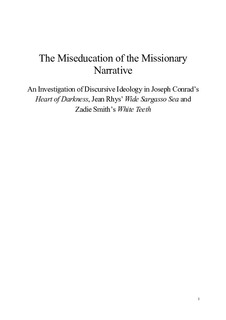The Miseducation of the Missionary Narrative: An Investigation of Discursive Ideology in Joseph Conrad's Heart of Darkness, Jean Rhys' Wide Sargasso Sea and Zadie Smith's White Teeth
Master thesis
Permanent lenke
http://hdl.handle.net/11250/2504262Utgivelsesdato
2018-05Metadata
Vis full innførselSamlinger
- Student papers (HF-IKS) [905]
Sammendrag
In a post-colonial world, the focus on colonial issues might seem like kicking in open doors; however, on an ideological level, narratives from the imperial era still lives on. Thus, this thesis focuses on an ideological narrative rooted in imperialism. Ideological narratives are frameworks that work to structure reality to make it more comprehensible and available to us. However, the problem arises when these narratives provide a false perception of the world. Addressing these narratives is important to disclose inherit prejudice and misconceptions. Consequently, this thesis uses the term “miseducation” in its title. The term points to, quite aptly, the possible pitfall of narratives. Specifically, this thesis focuses on the so-called “missionary narrative” and its ramifications. The missionary narrative puts forth the idea that the coloniser is superior to the colonised and, subsequently, that the colonisers have the right and duty to spread culture and religion. Derived from this narrative, is a perceived binary opposition between the colonisers and the colonised. In this thesis, this false binary is referred to as the Metropolis/Other binary. To reveal the effect of the missionary narrative and the Metropolis/Other binary, this thesis conducts close reading of three novels.
The novels in question are Heart of Darkness by Joseph Conrad, Wide Sargasso Sea by Jean Rhys, and White Teeth by Zadie Smith. These novels provide different perspectives and focuses regarding the missionary narrative. In my analysis, I focus on the way the novels both resist and are trapped by the narrative. Additionally, I investigate different concepts related to the missionary narrative. Through discourse analysis, these concepts reveal how the discourse around the missionary narrative has evolved over time. Namely, these concepts are the “Creole”, “mestizaje”, “Englishness”, “multiculturalism”, “Westernism”, “traditionalism”, and “hybridity”. By looking at these novels, I wish to further the understanding of literature’s role in the face of ideological narratives. Can literature serve as counternarratives against monolithic ideological narratives? If so, how does literature resist ideological structures?
Beskrivelse
Master's thesis in Literacy Studies
